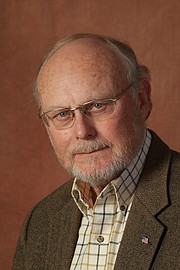[ad_1]
The two of us became acquainted when we organized Montana’s first Earth Day on the MSU campus in Bozeman in 1970. We both turned 23 in the same year and were representing different communities and political parties in Montana’s Legislature. In the past 50 years our mutual interest in various issues has brought us together many times — but never with such a sense of urgency as today, regarding our concern for the Earth’s climate.
The recent shocking assessment by the United Nations Intergovernmental Panel on Climate Change, as well as the Greater Yellowstone Climate Assessment (GYCA) focusing on our own piece of the planet, has brought us together ever more strongly to amplify the stark warning of many preeminent climate scientists informing us that world climate change is already causing “dangerous and widespread disruption” to billions of people and countless creatures.
This is not a distant projection. It is now.
The reports reveal that the effects are manifesting faster than anticipated, far exceeding our current and quite pitiful efforts in reversing them or adapting to them. In Washington, D.C., as well as in the Greater Yellowstone ecosystem, and Montana in general, there is a dearth of meaningful public policy that addresses and adapts to climate change.
Plain evidence of the report’s warnings is in front of us. Montana is experiencing hotter summers, drought years, lower snowpack, and earlier peak stream flows. Wildfires have become so predictable that the concept of a “construction season” is being replaced by a “smoke season.” If you are a mountain hiker you see any number of dying trees, while down in the plains you see baked ground and no grass.
Both domestic and wild species are being affected by the impacts. According to one of the authors of the GYCA, the “average temperature of recent decades is as high or higher than any period in the last 20,000 years, and likely the warmest of the last 800,000 years …” That puts us in uncharted territory.
Followers of national news will see long-term reservoirs disappearing, wild weather patterns, and the rise in seawater in coastal cities.
If one follows global news, the stories of human and animal misery are too grim to dwell on — drought, water shortages, malnutrition, famine, floods, population displacement and conflict.
Meaningful political discussion on the climate crisis is generally moved to the back burner, displaced by the latest crisis — Ukraine, inflation, voting rights, Covid — all of which are fiercely important and in their own ways connected to climate change, and each requires us to improve our ability to be policy multi-taskers. Otherwise, we “will miss a brief and rapidly closing window of opportunity to secure a livable and sustainable future for all,” according to the 35-page summary of the UN panel’s findings.
These are difficult and deadly truths that the world leaders have ignored or avoided. Or they have been too overwhelming to address. We cannot continue to ignore the inferno coming down from the ridge while we focus on the fire in the backyard.
The U.S. and some other top carbon emitters must lead the world beyond incremental, ineffectual actions to a concentrated, bold commitment towards clean energy. The truth is that the industrialized world must be a leader in massive social change.
All of us must play a part in this effort, whether that’s examining our own unsustainable lifestyles or becoming more informed, speaking out, or going to the mat for committed leaders. The world’s changing climate is the biggest issue of our time — really, of all time. It is also the most important issue we ignore.
U. N. Sec. General Antonio Gutierrez said that climate inaction is no longer an option, and that “delay means death.”
We are approaching our country’s 51st Earth Day. Let’s commit ourselves to ensuring that our planet, and all its species and all its beauty, is thriving 51 years from now.
Bob Brown and Dorothy Bradley were both Montana legislators for many years. Bradley was the Democratic nominee to governor in 1992. Brown was the Republican nominee to governor in 2004.





